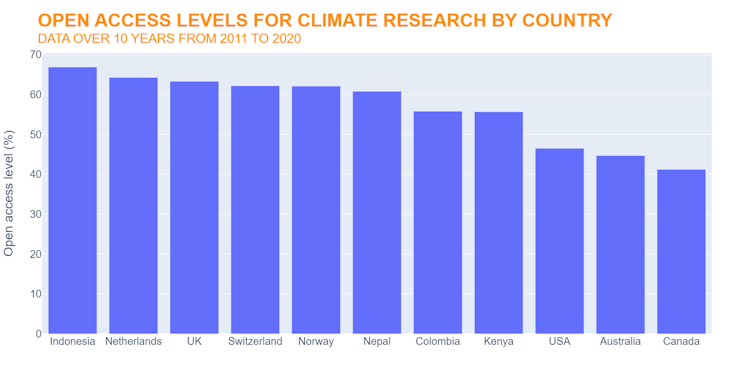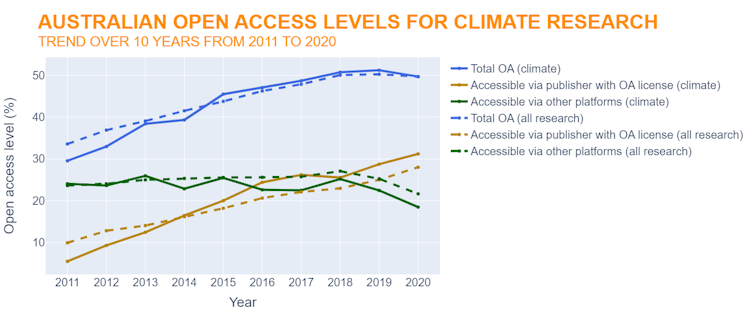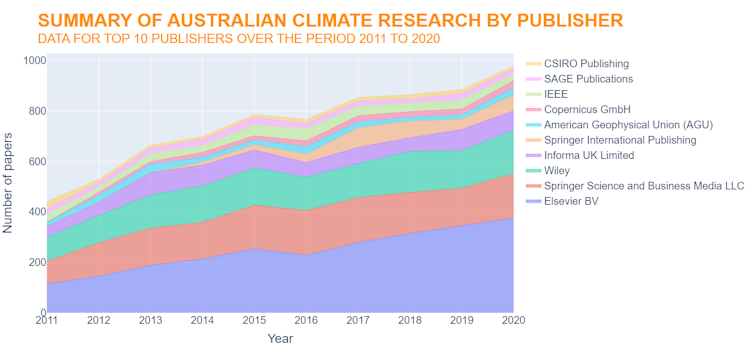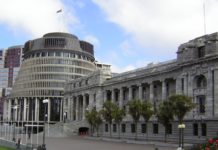Source: The Conversation (Au and NZ) – By Lucy Montgomery, Program Lead, Innovation in Knowledge Communication, Curtin University

Shutterstock
The COP26 meeting has sharpened the world’s focus on climate change. To adapt and thrive in a world of reduced emissions, Australian businesses and communities need access to the technologies and innovation made possible by the nation’s researchers. But most Australian research is locked behind publisher paywalls.
Open access to research has become an important strategy to speed innovation. Making COVID-19-related research and data publicly accessible to fast-track the development of vaccines, treatments and policies is one example.
Given the gravity of the global climate emergency, it seems reasonable also to use open access to help speed green innovation.
Read more:
All publicly funded research could soon be free for you, the taxpayer, to read
But, as Prime Minister Scott Morrison recently noted, research systems driven by a “publish or perish mindset” do little to spur innovation. Scholarly communication models that lock research behind paywalls slow the flow of new knowledge from researchers into real-world innovation.
Australian universities pay hundreds of millions of dollars in subscription fees each year for access to publications by Australian researchers. Businesses, policy advisers, think-tanks and private individuals who don’t have access to a university library must either pay separately for access or miss out.
This is despite the fact Australia invests an estimated A$12 billion of taxpayer money each year in research and innovation, according to Chief Scientist Cathy Foley. Action is needed to ensure this publicly funded research can be translated into innovation for the wider economy.
How does Australia compare to the world?
International research communities are already using open-access strategies to maximise the impacts of climate-related research. Our analysis of publication data* shows between 2011 and 2020 the proportion of research on climate change that is open access rose from 30% to 50%. This is consistent with an accelerating international shift towards “public access to publicly funded research”.

Author provided
But Australia has lagged behind the rest of the world in making research open access.
More than half of the Australian research on climate change published in the past decade is behind a paywall. This puts Australia on par with the US and Canada – but well behind our nearest neighbour Indonesia, as well as most of Europe.
Australia’s low rates of open access have implications for communities in need of information about how to adapt to a warming world.

Author provided
Read more:
2020 locked in shift to open access publishing, but Australia is lagging
Australia’s research sector is pushing back
The Council of Australian University Libraries (CAUL) is leading the push for open access to Australian research. So-called “transformative agreements” are one aspect of its strategy. These are deals with publishers that cover both subscription access to articles that are still behind paywalls and open-access publishing rights for articles by Australian researchers.
In 2021 the CAUL signed transformative agreements with five major publishers.
Foley argues that a “gold” route to open access (paying publishers not to lock articles behind paywalls) is likely to cost less than Australian universities already pay for subscription access: between A$460 million and A$1 billion.
Foley wants a sector-wide approach that would result in all Australian research being published in open access, and all Australians able to access the journals that universities subscribe to.
What more needs to be done?
So will the latest transformative agreements make it easier to access research needed to tackle climate change?
The short answer is “yes, but we need to do more”.
A few big commercial publishers dominate scholarly publishing.
So far CAUL has signed deals with only two of the largest publishers of climate-related research: Wiley and Springer Nature. The Springer Nature deal excludes many of its most prestigious titles, including the journal Nature.
If the deals with Springer Nature and Wiley had applied to all 2020 publications, our analysis suggests they would have made up to 200 more articles immediately accessible on publication.

Author provided
Deals with the Big Five publishers will create a step change in the amount of Australian climate change research that is freely accessible. But there is a danger they will further lock in the monopolies of a few players.
Australian researchers could make a bigger difference to open access by making their work available through other online sharing platforms. Discipline platforms like arXiv, Pubmed Central or university systems like QUT’s ePrints are examples.
Our analysis found less than 40% of Australia’s 2019 research output is accessible through these platforms. Australian researchers could make 1,400 articles on climate change more accessible by depositing them in a free open access repository today.
Tackling climate change and improving access to research are both complex and controversial issues. In each case, thinking through the implications in the short, medium and long term will be key to helping Australia achieve its goals.
* Data statement: data were obtained from Crossref metadata, Unpaywall, Microsoft Academic and the Global Research Identifier Database, via the data infrastructure developed by the Curtin Open Knowledge Initiative, Curtin University. “Climate change” is a topic category available from Microsoft Academic and this was supplemented by a search for terms associated with UN Sustainable Development Goal 7, “clean energy” and “net zero”.
![]()
Lucy Montgomery has received funding from Springer Nature for research relating to Open Access. She is also affiliated with a number or organisations involved in Open Access scholarly communication, including as a recipient of funding from the Andrew W. Mellon Foundation; and as a member of the Scientific Committees for the Directory of Open Access Books (DOAB) and the OAPEN Open Access Books Toolkit. Montgomery is non-executive director of the not-for-profit consultancy Collaborative Open Access Research and Development (COARD).
Cameron Neylon has received funding from Andrew W. Mellon Foundation, Springer Nature, the Arcadia Fund, Arnold Foundation, Open Society Foundations, Canadian Social Sciences and Humanities Research Council and other organisations for research relating to Open Access. He is also affiliated or has an advisory role with a number or organisations involved in Open Access scholarly communication, including as part of the Initiatives for Open Citations and for Open Abstracts, an Advisory Board Member of Open Book Publishers, and others. Neylon is a non-executive director of the not-for-profit consultancy Collaborative Open Access Research and Development (COARD).
Karl Huang does not work for, consult, own shares in or receive funding from any company or organisation that would benefit from this article, and has disclosed no relevant affiliations beyond their academic appointment.
– ref. What can we gain from open access to Australian research? Climate action for a start – https://theconversation.com/what-can-we-gain-from-open-access-to-australian-research-climate-action-for-a-start-171821








